Sustainable finance opens up opportunities for long-term capital access
The private economy is identified as an important driving force of the economy, and is also a pioneer in developing science and technology, innovation and digital transformation. In recent times, the system of policies and support mechanisms for this region has had many positive changes, clearly demonstrating the determination of the State and the Government in promoting the private economy for equal, transparent and sustainable development.
In that context, Resolution 68-NQ/TW of the Politburo was issued as an important policy boost to remove bottlenecks and create momentum for a breakthrough for the private economic sector. The Resolution clearly identifies the goal of strongly improving the investment environment, reducing at least 30% of administrative procedures, compliance costs and business conditions; at the same time promoting sustainable financial resources, land reform and information transparency.
In that process, finance and real estate are two pillars that play a particularly important role.
According to Mr. Nguyen Quang Thuan - Chairman of FiinGroup, sustainable finance is becoming a global trend and opening up great opportunities for Vietnamese private enterprises to access long-term capital at reasonable costs. Tools such as green credit, green bonds, social bonds or sustainable bond (GSS+) not only help reduce loan interest rates but also increase investor confidence, especially in projects applying ESG standards.
Mr. Thuan also cited the latest content clearly reflecting this orientation as Resolution 68, which emphasized: "Promoting the development of green credit; The State has a mechanism to support interest rates and encourage credit institutions to reduce interest rates for private enterprises to borrow to implement green, circular projects and apply the environmental, social and governance standards (ESG) framework".
Along with that, the Resolution also requires: Reviewing the legal framework, perfecting the model of credit guarantee funds for small and medium enterprises at both central and local levels; encouraging the participation of financial institutions and large enterprises to guarantee loans for small and medium enterprises; accepting risks due to objective conditions, force majeure in guarantee activities; implementing management according to general goals; regulating reasonable financial reserve allocation levels, loosening guarantee conditions compared to bank loan conditions; having a mechanism to supplement resources and reasonable insurance policies to ensure the safety of the system. Research on establishing a re-guarantee fund and cross-guarantee and co-guarantee models....
This is an important foundation to help form a sustainable financial ecosystem, opening up new room for the private economic sector to access longer-term, safer and more transparent resources in the next development stage.
Creating motivation for real estate to promote and play a leading role
Along with the financial pillar is the real estate sector - an economic sector with high spread and is the main component of the private sector. According to the assessment of the Vietnam Association of Realtors (VARS), real estate enterprises are a particularly important component of the private economic sector, playing a leading role in many development axes such as urbanization, infrastructure, industry, trade, tourism and services.
The activities of this area also attract more than 40 related industries such as construction, materials, finance - banking, labor and consumption...
However, the market is showing many limitations. Many leading private enterprises face difficulties when projects are suspended or stalled due to legal problems, overlapping administrative procedures, long approval times, slow site clearance, and many bottlenecks in granting land use right certificates.
These problems not only affect the ability to implement projects but also reduce market confidence, threatening the sustainable development of the real estate industry in particular and the economy in general.
transparent institutions are the foundation for unlocking resources
According to VARS, Resolution 68 has gone straight to resolve the "bottlenecks of bottlenecks". Solutions such as reviewing and eliminating inappropriate business conditions, cutting at least 30% of the time for handling administrative procedures, compliance costs and business conditions will contribute to removing institutional bottlenecks, paving the way for businesses to develop.
At the same time, the completion of the national land database connected to related systems, promoting electronic transactions and publicizing information will be an important foundation to help the market evaluate transparently, improve the efficiency of project management and implementation.
If implemented synchronously and effectively, Resolution 68 will create a mechanism revolution, helping to shorten the process of handling procedures, increase the number of approved projects and unblock the supply that is being suppressed in the market.
In the short term, there may be a situation of slow processing of documents due to the process of merging and streamlining the apparatus. But in the medium and long term, when the apparatus operates stably, procedures will become more transparent, clear and effective.











